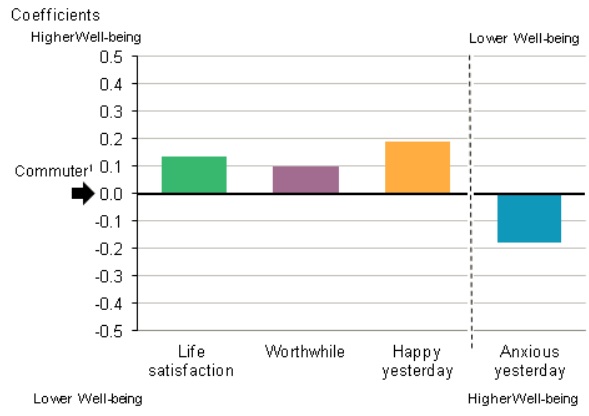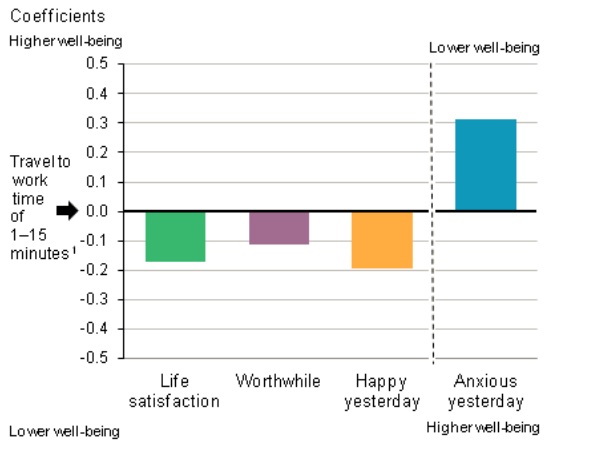Is commuting making me miserable? Yes, officially and statistically, it is!
I hate the morning commute. And I have nothing to moan about, really. When I lived in the UK, I lived close enough to work that I could walk there. However, I often worked away at clients, which meant an hour’s drive, or a two hour train. I would long for those days working in the office so I didn’t have to go through that awful commute. Then, when I moved to France, I decided to live in the area of Marseille nearest the nice beaches, in a pleasant residential area. Unfortunately, my work is near the docks at the other end of the city. It’s not really far – a 20 minute walk, followed by a 10 minute metro. There is nothing to complain about – a pleasant walk in the sun, followed by a timely and never overcrowded metro.
However, sitting here writing this before work this morning, I’m still dreading my imminent commute. And I’m not the only one. It’s now official: commuting makes you miserable.
The study
The Office of National Statistics (ONS) performed a comprehensive study of happiness in 2013. They inspected which identified some of the personal characteristics and circumstances that matter most to personal well-being. However, the study somewhat overlooked the impact of commuting on happiness.
Previous studies found that commuting was negatively related to aspects of personal wellbeing such as life satisfaction (Stutzer and Frey 2008). Others noted wider measures of mental health and well-being (Robert, Hodgson and Dolan 2009). Using the relative size and strength of the relationship between commuting and personal well-being when other possible influences on well-being are held constant, their new research specifically examines:
- Commuting compared with non-commuting
- Usual time spent commuting
- Method of travel
Commuting vs working from home
The first part of the research compared the personal well-being of people who regularly travel to work (commuters) versus those who work from home in their main job (non-commuters). The graph below illustrates that commuters were on average:
- less satisfied with their lives,
- rated their daily activities as less worthwhile, and
- reported less happiness and higher anxiety than non-commuters
The graph is a little peculiar, but essentially it represents commuters as 0.0 on the y-axis. For each category, it then plots how much higher or lower non-commuters score in the category. For example, non-commuters score a coefficient of 0.14 higher in life satisfaction that their commuting counter-parts.
The most significant point here is that they rate their “happiness” 0.19 points higher (on a scale from 1 to 10) than their commuting friends. Whilst this may not seem like a lot, in the context of the sample sizes, it is statistically relevant.
Usual time spent commuting
This part of the study really interests me. The research shows an almost liner relationship between time spent commuting and the results in all the above categories. It has shown that for every minute commuted, the impact is increased by 0.002 points.
Therefore, in my 30 minute commute, I would score 0.06 less than the non-commuters in life satisfaction, worthwhile and happiness yesterday. If my commute was two hours (which isn’t unusual in today’s society), my score would be 0.24 less – this is significant! The following graph shows the difference between people commuting between 61-90 minutes, compared to those travelling 1-15 minutes as a base:
Method of transport
Finally, the study inspects the mode of transport:
In summary, this table shows us that:
- those who travel to work by bus or coach had lower levels of life satisfaction and a lower sense that their daily activities are worthwhile on average than those who travelled to work in a private vehicle;
- people who take the train to work had higher anxiety levels on average than those who travelled in a private vehicle;
- people who walk to work had lower life satisfaction and a lower sense that their activities are worthwhile on average than those who commute to work in a private vehicle; and
- those who reported travelling to work in ‘some other way’ had higher life satisfaction and lower anxiety levels than those travelling in a private vehicle.
Combining it all
So, the study’s overall conclusions are:
- Those travelling to work in a private vehicle had lower levels of happiness and higher anxiety levels on average for all journey times
- So not only is the private vehicle the most expensive form of transport, traffic jams lead to lower levels of happiness and higher anxiety. Ditch the car people!
- People spending between 16 and 30 minutes cycling to work had lower happiness levels and higher anxiety on average;
- I’m guessing that this is caused by cycling in London! From personal experience, I understand the higher anxiety.
- Those making long bus journeys to work of more than 30 minutes had lower life satisfaction, a lower sense that daily activities are worthwhile, lower happiness levels and higher anxiety;
- Wow. The whole set!! Fair enough – busy buses can be stressful. Certainly, I don’t know anyone who likes taking a bus for over 30 minutes!
- People commuting more than 30 minutes by train had higher anxiety levels on average
Social proof
A quick browse through my friends’ facebook updates shows me that the findings of this study probably hold quite a lot of truth! 
Commuting is just one of many factors that can lead to dissatisfaction with one’s job. According to a survey taken in 2012, only 19% of people feel real satisfaction in regards to their work. Aside from the commute, there are numerous factors that can negatively influence your satisfaction with your job.
Some of these factors include not being able to utilize your skills and work to your full potential, low pay or compensation, a rocky relationship with your immediate supervisor, and miscommunication amongst senior management and employees. Job satisfaction can by improved by simply understanding these issues and using proper communication co-workers and upper management.
However, moneystepper doesn’t just want to bring you problems – we like to give you solutions as well. Check out the extremely amusing “Beginner’s Guide to Commuting” for the solutions to all your commuting woes:
Alternatively, maybe all you have to do is listen to this song whilst you go through your daily commute – it somehow seems to make it all seem much more pleasant!! 🙂







I hated my commute each day when I had my day job. I am so happy that I work from home now!
My current commute is less than three miles each way. As raises have been scarce, bonuses non-existent, and benefits cut, this remains a top reason why I have not left my current position. It really does cut down on stress, increase happiness, and frees up time in my life to spend time with my kids or do things that I otherwise enjoy versus sitting in a car for a longer time each day.
I was previously earning higher but was not happy because I had to commute daily which I hated and dreaded. Now, working home-based although with lesser pay, I am also less grumpy. The pay reduction is okay because travel expenses were cut anyway.
I didn’t really mind my commute when I worked – 30 minutes door to door by car. I used it to gear up and decompress. Now, though I’m retired and the poor car hardly gets any exercise at all!
I’m always amazed when my loved ones refer to a 45 minute or hour commute as “not that bad”. WHAT?! That’s terrible.
I really dig not commuting. Once I wake up, I can start working whenever I want without moving 🙂
I’m very fortunate to live only a mile from work and can bike it most days. I’m actually surprised that the bike commuting didn’t rank higher on the happiness scale. I’ve always read that bicyclists are much happier, fresh air (sort of – minus inhaling car fumes), the wind in your hair/helmet, a bit of exercise. Maybe it’s the length of time that’s bringing it down.